
Poker is a card game in which players place chips (representing money) into the pot, where they compete to make the best five-card hand. The player with the highest ranked hand wins the pot, or all of the bets made in that round. Players may also win by convincing other players that they have the best hand, which is known as bluffing.
The first step to becoming a good poker player is knowing the rules of the game. It’s important to choose the right stakes and game variations for your bankroll and skills level. You can also use your knowledge to improve your strategy by studying the moves of other players.
To start, you should play low-stakes games to build up your confidence and skill levels. As your bankroll grows, you can gradually increase the stakes of your games. However, it is important to remember that there are still days when you will lose – no matter how good your game is.
There are many different poker variants, but Texas Hold’em is the most popular and easiest to learn. Its widespread popularity means there is a wealth of learning resources and straightforward gameplay makes it ideal for newcomers to the game. It is also possible to branch out to other types of poker as your skills develop.
During each betting interval, one player acts in turn, beginning with the person to their left. They can raise, call, or fold their cards. If they raise, they must bet at least as much as the player before them.
When they have a strong starting hand, such as a high pair or consecutive cards, it’s worth trying to make a straight or flush. But if they don’t, it’s usually better to fold. This will save you money in the long run and improve your chances of winning if you do get a good hand.
After the final betting phase, the dealer announces which hand was the highest and pushes the pot of chips to the winner. Players can also bet on their own hands to increase the prize.
The key to making your poker game profitable is understanding the strengths and weaknesses of your opponents. This will help you decide whether to bluff, call, or raise your bets. It’s also important to mix up your plays to keep opponents guessing about what you have. If they always know what you’re holding, your bluffs won’t have any effect and you won’t be able to make them fold when you do have a strong hand. You should also be careful to avoid tables full of strong players, as they can be a challenge to beat. Moreover, strong players will likely be more confident than you and can put you under pressure, which could reduce your chances of winning. It’s also essential to develop quick instincts to help you decide how to play your cards and your opponents. Watch experienced players and practice to develop these instincts.